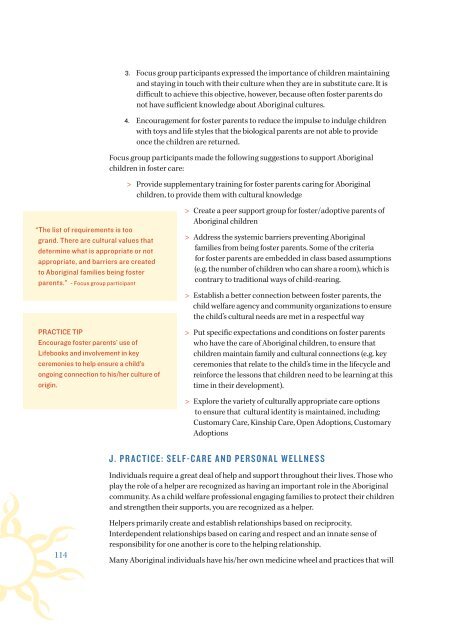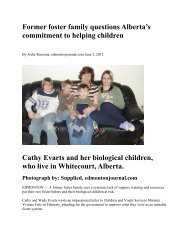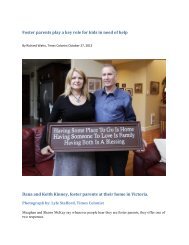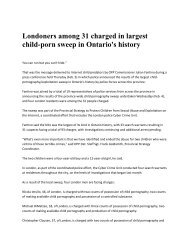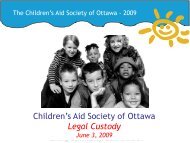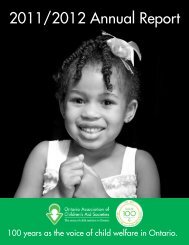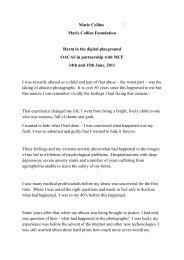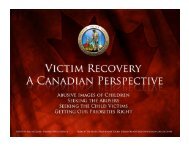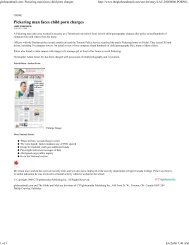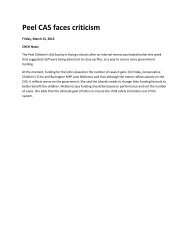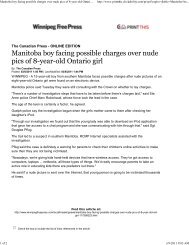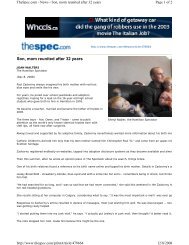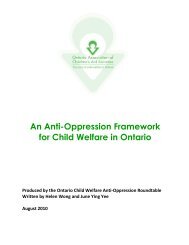English - Ontario Association of Children's Aid Societies
English - Ontario Association of Children's Aid Societies
English - Ontario Association of Children's Aid Societies
Create successful ePaper yourself
Turn your PDF publications into a flip-book with our unique Google optimized e-Paper software.
3. Focus group participants expressed the importance <strong>of</strong> children maintaining<br />
and staying in touch with their culture when they are in substitute care. It is<br />
difficult to achieve this objective, however, because <strong>of</strong>ten foster parents do<br />
not have sufficient knowledge about Aboriginal cultures.<br />
4. Encouragement for foster parents to reduce the impulse to indulge children<br />
with toys and life styles that the biological parents are not able to provide<br />
once the children are returned.<br />
Focus group participants made the following suggestions to support Aboriginal<br />
children in foster care:<br />
> > Provide supplementary training for foster parents caring for Aboriginal<br />
children, to provide them with cultural knowledge<br />
“The list <strong>of</strong> requirements is too<br />
grand. There are cultural values that<br />
determine what is appropriate or not<br />
appropriate, and barriers are created<br />
to Aboriginal families being foster<br />
parents.” - Focus group participant<br />
PRACTICE TIP<br />
Encourage foster parents’ use <strong>of</strong><br />
Lifebooks and involvement in key<br />
ceremonies to help ensure a child’s<br />
ongoing connection to his/her culture <strong>of</strong><br />
origin.<br />
> > Create a peer support group for foster/adoptive parents <strong>of</strong><br />
Aboriginal children<br />
> > Address the systemic barriers preventing Aboriginal<br />
families from being foster parents. Some <strong>of</strong> the criteria<br />
for foster parents are embedded in class based assumptions<br />
(e.g. the number <strong>of</strong> children who can share a room), which is<br />
contrary to traditional ways <strong>of</strong> child-rearing.<br />
> > Establish a better connection between foster parents, the<br />
child welfare agency and community organizations to ensure<br />
the child’s cultural needs are met in a respectful way<br />
> > Put specific expectations and conditions on foster parents<br />
who have the care <strong>of</strong> Aboriginal children, to ensure that<br />
children maintain family and cultural connections (e.g. key<br />
ceremonies that relate to the child’s time in the lifecycle and<br />
reinforce the lessons that children need to be learning at this<br />
time in their development).<br />
> > Explore the variety <strong>of</strong> culturally appropriate care options<br />
to ensure that cultural identity is maintained, including:<br />
Customary Care, Kinship Care, Open Adoptions, Customary<br />
Adoptions<br />
114<br />
J. PRACTICE: SELF-CARE AND PERSONAL WELLNESS<br />
Individuals require a great deal <strong>of</strong> help and support throughout their lives. Those who<br />
play the role <strong>of</strong> a helper are recognized as having an important role in the Aboriginal<br />
community. As a child welfare pr<strong>of</strong>essional engaging families to protect their children<br />
and strengthen their supports, you are recognized as a helper.<br />
Helpers primarily create and establish relationships based on reciprocity.<br />
Interdependent relationships based on caring and respect and an innate sense <strong>of</strong><br />
responsibility for one another is core to the helping relationship.<br />
Many Aboriginal individuals have his/her own medicine wheel and practices that will


